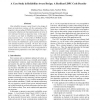Free Online Productivity Tools
i2Speak
i2Symbol
i2OCR
iTex2Img
iWeb2Print
iWeb2Shot
i2Type
iPdf2Split
iPdf2Merge
i2Bopomofo
i2Arabic
i2Style
i2Image
i2PDF
iLatex2Rtf
Sci2ools
DATE
2008
IEEE
2008
IEEE
A Case Study in Reliability-Aware Design: A Resilient LDPC Code Decoder
Chip reliability becomes a great threat to the design of future microelectronic systems with the continuation of the progressive downscaling of CMOS technologies. Hence increasing the robustness of chip implementations in terms of error tolerance becomes an important issue. In this paper we present a case study in reliability-aware design tolerating transient errors. A state-of-the-art WiMAX channel decoder for LDPC codes is investigated on all design levels to increase its reliability for a given system performance with minimum hardware overhead. We show that an efficient exploitation of the algorithmic fault-tolerance yields a fairly small area overhead with nearly no degradation in communications performance even under high error injection rates.
| Added | 29 May 2010 |
| Updated | 29 May 2010 |
| Type | Conference |
| Year | 2008 |
| Where | DATE |
| Authors | Matthias May, Matthias Alles, Norbert Wehn |
Comments (0)

